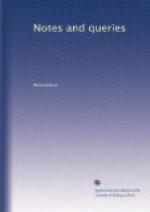J.I.
Oxford.
Gowghe’s Dore of Holy Scripture.—If your correspondent “F.M.” (No. 9. p.139.) has not received a reply to his third query, I beg to submit that he will find the perusers of Gowghe’s work to be the individuals mentioned in different portions of Foxe’s Acts and Monuments, vol. v. edit. 8vo. pp. 414.449. 482.; the less intelligible names, “Doctor Barons, Master Ceton,” being intended for Dr. Barnes and Alexander Seton. Anyhow, this reference may, it is hoped, lead to a fuller discovery of the parties intended.
NORRIS.
Reinerius Saccho.—Your correspondent “D.” (No. 7. p.106.) will find some account of Reinerius Saccho, if the source is accessible, in Quetif and Echard’s Scriptores Ord. Praedicatt. tom. i. 154.
N.
Discurs Modest.—Your correspondent “A.T.” (No.9. p.142) may be informed that there can be no reasonable doubt, that the original authority, for Rem transubstantiationis patres ne attigisse quidem, is William Watson in his Quodlibet, ii. 4. p.31.; that the Discurs. Modest. de Jesuitis borrowed it from him; that Andrews most probably derived it from the borrower; and that the date of the Discurs. &c. must, therefore, be between 1602 and 1610. Probably there may be a copy in the Lambeth Library; there is none in the Bodleian, British Museum, or Sion College, and Placcius affords no reference. The author may never have been known.
N.
Defoe’s Tour through Great Britain.—I am much obliged to your correspondent “D.S.Y” for the suggestion that the Tour through Great Britain, by a Gentleman, from which I sent you some extracts relating to the Ironworks of Sussex, is from the pen of Daniel Defoe. On referring to the list of his writings, given in vol. xx. of C. Talboy’s edition of Defoe’s Works, I find this idea is correct. Chalmers notices three editions of the work, in 1724, 1725, and 1727, (numbered in his list “154,” “156,” “163,”) and remarks that “all the subsequent editions vary considerably from the original” of 1724. He states that “this work is frequently confounded with ’John Macky’s Journey through England, in familiar Letters from a Gentleman here to his Friend abroad,’ 1722.” I may take this opportunity of mentioning that, in the first volume of Defoe’s work, there are some very interesting particulars of the skirmish at Reading, between the troops of the Prince of Orange and the Irish forces of James II., and the panic known as the “Irish night,” which deserve to be consulted by Mr. Macaulay, for the next edition of his History. The whole work will well repay a perusal, and what is there of Defoe’s writing which will not?
D.S.
Muffins.—The correspondent who, in No. 11., p. 173., inquires the origin of the word “Muffin,” is referred to Urquhart’s Pillars of Hercules, vol. ii. p. 143., just published, where he will find a large excursus on this subject. The word, he avers, is Phoenician: from maphula, one of those kinds of bread named as such by Athenaeus. “It was a cake,” says Athenaeus, “baked on a hearth or griddle.” He derives this by taking away the final vowel, and then changing l for n; thus: “maphula,” “maphul,” “mufun!!!”




